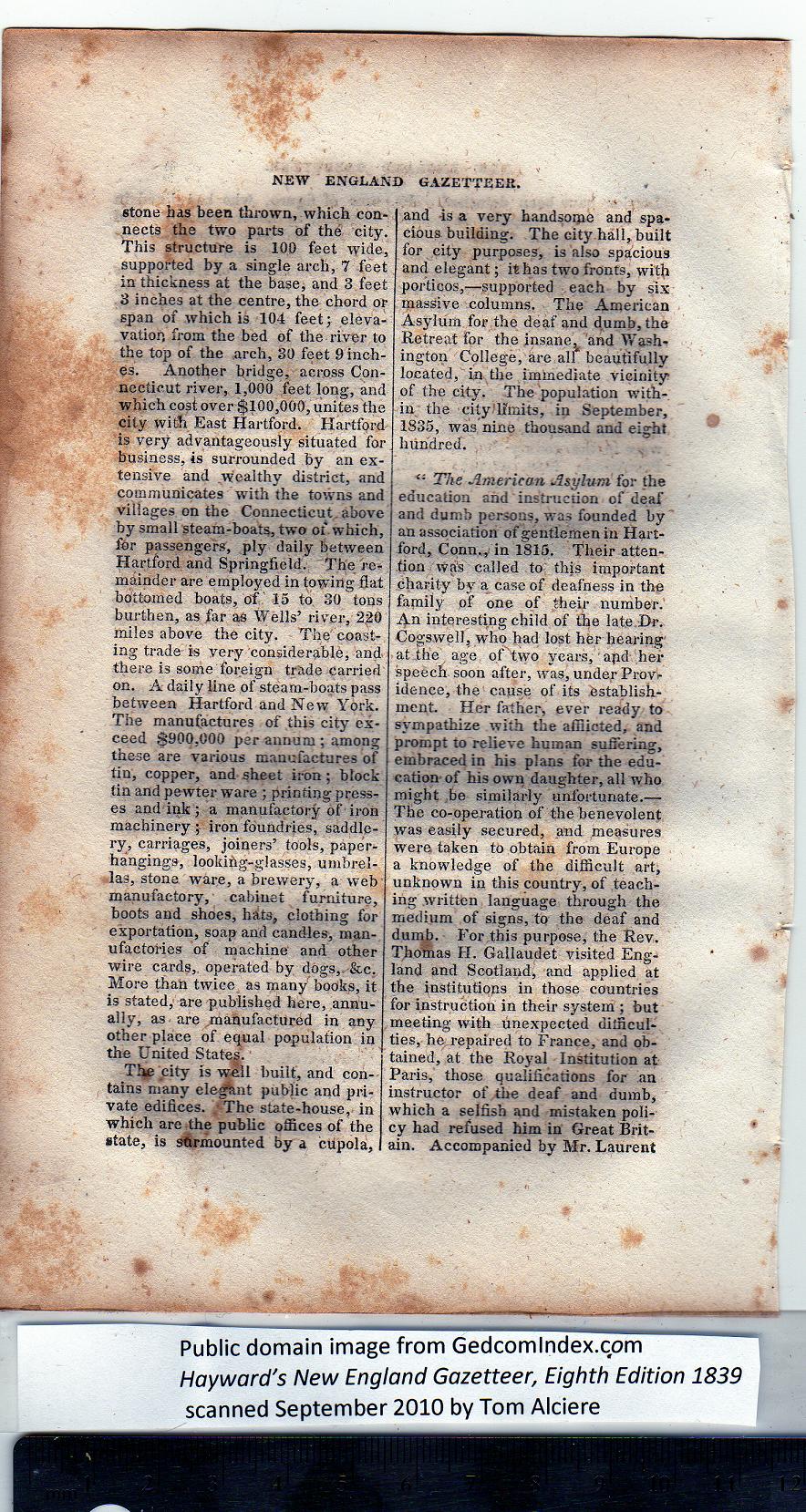|
stone has been thrown, which con-
nects the two parts of the city.
This structure is 100 feet wide,
supported by a single arch, 7 feet
in thickness at the base, and 3 feet
3 inches at the centre, the chord or
span of which i3 104 feet; eleva-
vation, from the bed of the river to
the top of the arch, 30 feet 9 inch-
es. Another bridge, across Con-
necticut river, 1,000 feet long, and
which cost over $100,000, unites the
city with East Hartford. Hartford
is very advantageously situated for
business, is surrounded by an ex-
tensive and wealthy district, and
communicates with the towns and
villages on the Connecticut above
by small steam-boats, two of which,
for passengers, ply daily between
Hartford and Springfield. The re-
mainder are employed in towing flat
bottomed boats, of 15 to 30 tons
burthen, as far as Wells’ river, 220
miles above the city. The coast-
ing trade is very considerable, and
there is some foreign trade carried
on. A daily line of steam-boats pass
between Hartford and New York.
The manufactures of this city ex-
ceed $900,000 per annum ; among
these are various manufactures of
tin, copper, and sheet iron; block
tin and pewter ware ; printing press-
es and ink ; a manufactory of iron
machinery ; iron foundries, saddle-
ry, carriages, joiners’ tools, paper-
hangings, looking-glasses, umbrel-
las, stone ware, a brewery, a web
manufactory, cabinet furniture,
hoots and shoes, hats, clothing for
exportation, soap and candles, man-
ufactories of machine and other
wire cards, operated by dogs, &.c.
More than twice as many books, it
is stated, are published here, annu-
ally, as are manufactured in any
other place of equal population in
the United States^. |
Tl^e city is w-ell built, and con-
tains many elegant public and pri-
vate edifices. /The state-house, in
which are the public offices of the
itate, is surmounted by a cupola,
and is a very handsome and spa-
cious building. The city hall, built
for city purposes, is also spacious
and elegant; it has two fronts, with
porticos,—supported each by six
massive columns. The American
Asylum for the deaf and dumb, the
Retreat for the insane, and Wash-
ington College, are alf beautifully
located, in the immediate vicinity
of the city. The population with-
in the city limits, in September,
1835, was nine thousand and eight
hundred.
“ The American Asylum for the
education r.nd instruction of deaf
and dumb persons, was founded by
an association of gentlemen in Hart-
ford, Conn., in 1815. Their atten-
tion was called to this important
charity by a case of deafness in the
family of one of their number.
An interesting child of the late Dr.
Cogswell, who had lost her hearing
at the age of two years, ajid her
speech soon after, was, under Prov<-
idence, the cause of its establish-
ment. Her father, ever ready to
sympathize with the afflicted, and
prompt to relieve human suffering,
embraced in his plans for the edu-
cation of his own daughter, all who
might be similarly unfortunate.—
The co-operation of the benevolent
was easily secured, and measures
were taken to obtain from Europe
a knowledge of the difficult art,
unknown in this country, of teach-
ing written language through the
medium of signs, to the deaf and
dumb. For this purpose, the Rev.
Thothas H. Gallaudet visited Eng-
land and Scotland, and applied at
the institutions in those countries
for instruction in their system ; but
meeting with unexpected difficul-
ties, he repaired to France, and ob-
tained, at the Royal Institution at
Paris, those qualifications for an
instructor of the deaf and dumb,
which a selfish and mistaken poli-
cy had refused him in Great Brit-
ain. Accompanied by Mr. Laurent |
